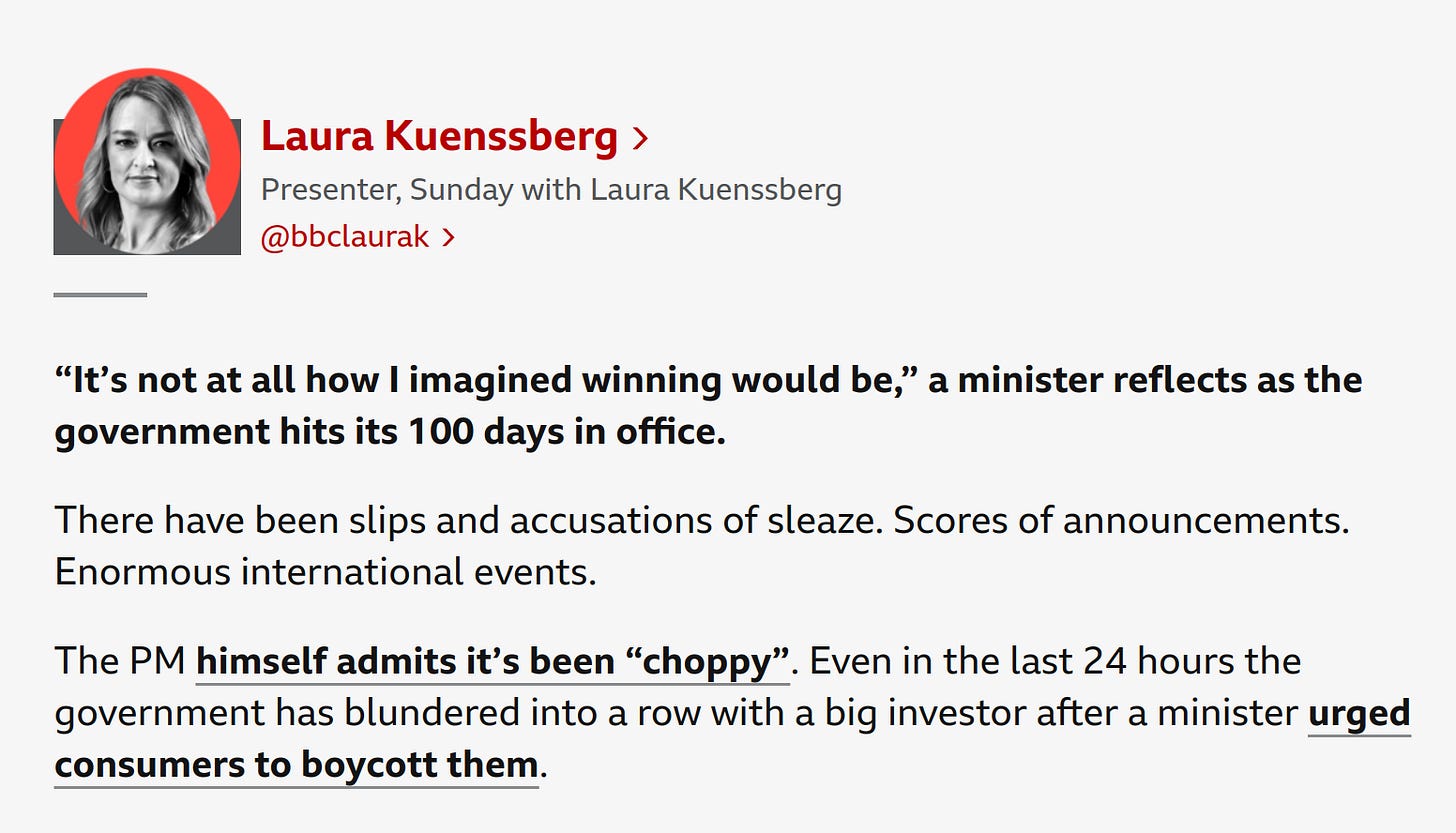120 Days Of Sod 'Em
Even if you know what you're doing, climbing onto high horses is dangerous
[BE WARNED: THE YOUTUBE VIDEO EMBEDDED AT THE END CONTAINS A MASSIVE SPOILER FOR ANYONE WHO HASN’T SEEN BREAKING BAD.]
I started writing this substack a few weeks back, intending to argue—against those in the media claiming otherwise—that this Labour government’s bad start in office was going to continue. Every time my own life stopped me from completing this essay, that same Labour government hit the news with a new screw-up, making my prediction less impressive.
Luckily, our mostly-pro-Starmer broadcast commentariat are so lazy and partisan that they keep giving us new failed predictions to laugh at.
For example, we can always count on James “How To Be Right” O’Brien: He didn’t let us down yesterday, when, after yet more rambling whataboutery concerning Boris Johnson, he told us this…
“I would stake what’s left of my reputation on there being no more details [about the incident that led to Louise Haigh’s resignation] to come out.”1
Just before this story dropped…
To be fair, O’Brien’s betting “what’s left of his reputation” is less impressive when you know that he previously bet on this.
A Convenient Stranger
One thing Substack is good for is that I can tell true stories here that would be drowned out by Didn’t Happen Of The Year heckles over on Twitter. On this site, there’s more space, the people reading me either know me personally or have already decided I’m not a bullshitter, and everyone knows that the incentives are different: It takes more effort to attention-seek and Like-harvest on Substack.
(Don’t get me wrong; I am King Of The Cynics; DHOTYA serves a useful purpose, because lots of people really do Make Shit Up For Clout: “My eight-year-old looked up from his Kumon work today, pointed at Boris Johnson on TV, and said: ‘Why does the blond man always lie?’.”)
But what about when something happens in real life that neatly makes a point? Am I going to pretend I hallucinated it? No. I’m going to substack it:
A few weeks back, I’m minding my own business, browsing the greetings cards in Morrisons. All the gift-giving stationery is in the same aisle next to the print magazines. A middle-aged man I have never seen in my life before walks up to me, holding a copy of Private Eye in his hand. He points at its front-page montage:
“Look at these! They’re funny! Serves them right.”
(They’re not funny.)
I have strong political opinions, but I’m British enough not to want to get into an argument in public. I also have internal organs that I don’t want perforated by an offended rando. So, in such situations, my first resort is diplomatic ambiguity. “They [Labour] do seem to have got themselves in a mess over this,” I reply, pretending to be even more interested in the birthday cards.
But Private Eye Man has found in me a responsive audience now. He goes for it. He rants for England about the state of the current government, about how Starmer and Rayner and the rest of them are a disgrace and an embarrassment and how difficult it will be to get rid of them—and it’s not just the freebies they’ve collected; their policies are bad for the country and bad for him and bad for me.
Yes, I agree with much of this; I mumble my assent accordingly; but I’m agreeing quietly because I’m listening properly now, and I’m listening properly now because I’m interested now. As I say so often, non-activist Brits rarely think about politics-with-a-capital-’P’ and even more rarely think out loud about it. Something Is Going On. It’s exactly the sort of unsolicited everyday voxpoppery that persuaded me back in 2016 to make the biggest wager of my life—on an online betting site—on UK citizens voting to Leave the EU.
At the very least, this encounter was a datum of what the pundits call “cut-through”. As when Biden’s public mental deterioration becoming so obvious to voters that US media could no longer spin it without sounding absurd to the ordinary people watching the US President’s behaviour on live TV, things were becoming so bad for Starmer’s team that even their biggest fans in the commentariat were faced with a choice between conceding that the wheels on the clown car—while not off yet—were in need of some tightening, or doubling down and going Full Comical Ali. Either way, it’s still impossible for them to travel back in time and rewrite their preceding gushing words of praise.
The Events Horizon
We need a word or phrase for the point at which a political leader—Truss, Sturgeon, Biden—has become such a liability in the eyes of the public that the politician’s credibility can no longer be spun by the politician’s party or their media champions, the point at which the whirlpool-circling ship of state approaches no return, the point at which not removing its captain dooms its crew to electoral oblivion.
We’re not there yet with Keir Starmer, but, even after just 100 days, his friends were already staging their first round of interventions:
The BBC2:
Andrew Marr in The New Statesman:
Beth Rigby of Sky News:
Pippa Crerar in The Guardian:
Whoever writes the editorials for The Independent:
Prophetic Fallacies
These are funny
So, before we get into the grit, let’s point and laugh at a few more of our supposedly professional, supposedly even-handed ex-state-broadcaster journalist fanboys (and one straightforward fanboy).

On the 5th of July, Andrew Marr, formerly Political Editor of BBC News, looked forward to “ordinary, down-to-earth, serious people, talking like the rest of us” being “in charge of the government”. Before the month was out, the country was rioting.
And, only a couple of months later, newspapers sympathetic to the government were reporting at length on a “civil war” involving both its political and civil service arms and asking questions both about government Ministers having accepted gifts from third parties and the way in which those ministers defended accepting those gifts. Those reports were dismissed as nothing more than media muck-raking—until one general in the non-existent fighting was suddenly toppled from her non-existent warhorse.
At which point, her fall was being spun as Starmer’s cunning “ruthlessness”:

Let’s fast-forward only weeks from Andrew Marr on BBC Question Time on the incoming government to newly installed Parliamentary Under-Secretary of State for Building Safety and Homelessness Rushanara Ali on BBC Any Questions. Here’s the reaction of the audience to her claim that “Keir Starmer is absolutely committed to restoring trust in politics”:
They’re laughing at her. They can’t help themselves. Because what she was saying was obviously funny even to a BBC Radio 4 listeners. The People had speed-run their way through Denial, Anger, Bargaining, Depression, and Acceptance, and were already at Mockery—leaving only Pity and Assisted Suicide to go.

What Sopel, former Chief Political Correspondent for the UK state broadcaster, was trying to say here was that he “doesn’t want to do the whole pathetic fallacy thing”. It’s an understandable mistake: The words “prophetic” and “pathetic” have a passing resemblance, like the words “sychophancy” and “stupidity”.
And, on the subject of stupidity, also last month, the new Foreign Secretary had annoyed a longstanding international ally against terrorism, left officials scrambling to deal with the fallout from his describing an ethnic cleansing as a “liberation”. and abandoned the Chagos Islanders, while claiming to be striking a blow for decolonisation.
More interesting than Sopel’s malapropism is how neatly this tweet from a supposedly impartial commentator, one who once addressed millions of voters on a daily basis, encapsulated the mood of a large subset of the nation’s establishment—from civil servants to clergy to other supposedly neutral broadcasters: a combination of sentimentality, unselfawareness, gross bias, and plain obliviousness to facts. (Because facts aren’t for graduates of elite universities; they’re for factory fodder.)
For full effect, this next one really needs its accompanying byline photo:
“The grownups are back in Westminster. The Tory psychodramas inside No 10 have been replaced by a serious Labour government focused on delivery. It’s going to take time for all of us to make the adjustment. Except, time is the one thing Keir Starmer is not going to allow his new cabinet. He knows that the only way to win over those who didn’t vote for him last Thursday is to make an immediate difference. These days even a landslide majority is no guarantee of a second term.”
That was Sunday 7th July. Here’s the same outlet on Sunday 6th October of the same year:
“Sue Gray has resigned from her position as Keir Starmer’s chief of staff after finding herself at the centre of a political storm since Labour came into power.
Gray will be replaced by Morgan McSweeney, the party’s election guru who masterminded Starmer’s succession from Jeremy Corbyn, with whom she is said to have found herself at odds in government.
While a number of senior Labour figures had downplayed the friction between Gray and McSweeney, both of whom are close to the prime minister, one cabinet minister had foreshadowed Gray’s future weeks ago, telling the Guardian: “One or both of them will have to go. It’s not going to be Morgan.””
I could do this all day. Fun as it is, I’ll stop now. (But you can find plenty more examples of this kind of juxtaposition out on Twitter.)
Yes, it’s happening and, yes, it’s good
But I’m a big fan of taking the long view. By the rules of British democracy—dare I call them our constitution?—this government has years to go. However, the key to taking the long view is to ignore the immediate drama and focus of the characters. It’s the nature of tragedy that the protagonists are doomed by their inherent flaws.
Because, on their own terms, its less the chronic wrongness of the UK media-establishment consensus that matters; it’s their chronic inability to sniff out the real story.
The Real Story
Reality has already proved most of them comprehensively wrong about the material consequences of Brexit, but the greatest peri-referendum failing of journalists—especially because it’s their job—was to miss the bigger disaster:
that the EU is constitutionally doomed to secular decline by the fundamentals of economics. (Writers for the Financial Times in particular have no excuse for getting so drunk on Remainerism that they repeatedly tried to deny the gravity of financial arithmetic.)
that, as bad as corresponding trends are for the United Kingdom, its ancient democratic settlement—a settlement as influential as it’s idiosyncratic—at least offers its citizens a way out that continued EU membership would have blocked.
Similarly, they were too busy branding Leave voters “racists” to spot the blockbuster news, now falling out all around us, that Boris-and-Rishi’s Brexit regime promised on paper the biggest influx of non-white immigrants in UK history. Political correspondents could not be bothered to read public-domain government policy commitments.
But things are so bad now that the previous tension between journalists reporting on (what they must always call) “chaos” in the government’s leadership and those same journalists claiming this chaos is temporary or trivial is dissipating. And I write that as someone who believes that Starmer is going nowhere any time soon..
I’ve said before that Labour’s moral failings and its lack of a “vision” won’t keep the party from power. I’m saying now that Labour’s cabinet of skeletons, chronic infighting (in itself)3, and catastrophic news management aren’t going to bring the government down either. Of course I wish it otherwise; but, because I care more about being right than about defeating my enemies; and because my living doesn’t depend on my flattering my readers’ prejudices or keeping in with a particular media-political set, I have to admit that.
This last consideration also means my eyes aren’t, unlike a newspaper journalist’s, fixed on Time’s sweeping second-hand. I can afford (literally) to take a longer view. My view in this case is that, in the long run (before its full term has expired), this government is already in terminal decline.
Its tragic faults lie deeper. They can’t be fixed by removing someone other than the PM, however senior, who is bad at her job and appointing someone who appears to be good at his.
Its fatal flaws are threefold:
Its leadership is incompetent.
The people it works with and who voted for it hate it.
Its policies are broken—on their own terms.
I’ll address each briefly for now. There are and will be many more supporting examples, and I’ll probably be forced to write about them here over the next couple of years.
1. The childlike incompetence of the Chief Grown-Up
Here’s Prime Minister Keir Starmer being interviewed by Sky News’s Beth Rigby:
What's amazing here is that Beff taps the ball to Starmer in the gentlest way possible—by inviting him to comment on appearances not actions; by asking only to empathise with voters, not to justify what he’s done. But Starmer chooses—actively chooses—to take a huffy swing and kick it up into his own face. [If you want to see his face during this, I recommend you check out the video embedded in the tweet this audio comes from.]
Any seasoned political operator would recognize a sympathetic set-up from a friend in the media and tap the ball back to her:
"Yes, you're right, I can understand how some people might see things that way, and some in the media have been keen to paint all these things in the worst possible light, but..."
Instead, Starmer drags his own son into the public square and hides behind him, talks over his interviewer’s citing of other (quite relevant) examples, and defends choices that he will subsequently reverse, at least one of which might in fact have been against the rules.
Again, I link to a previously not-unsympathetic news provider: the BBC. Because it’s important to appreciate exactly how bad Starmer is at this stuff—even while he's still playing on Easy Mode.
This is the boss of Marr’s “ordinary, down-to-earth, serious people, talking like the rest of us”, given the opportunity to identify with the rest of us, but completely failing to say anything that might be recognisable as their language.
Slow-witted, unselfaware presentation is only the visible part of the iceberg; now, the part of the Labour Party that still has a reputation for delivering meaningful change has gone public with its concern about the other 90%.
In addition to accusing Starmer’s Ministers and aides of being “not very good”, a source in the article accuses them of being “a bunch of academics and librarians in charge of a government”. To me, this faint praise is all the more damning, because at least academics and librarians are thought to be clever and organised, and this government has so far shown little evidence of either quality.
This also leads into the next dooming flaw, because it tells us that even those ideologically adjacent and tribally committed to Starmer, those who helped put him where he is, don’t think much of him. In any organisation accountable to the public, if you’re not visibly liked by your colleagues, you’re invisibly marked to be a scapegoat.
2. Counsell’s Termination Heuristic
It’s not just that the old Labour Right has been unsupportive of Starmer’s operation. The Office Of Budget Responsibility has not been supportive of the Chancellor Of The Exchequer’s central claim about government finances, upon which her poorly received first Budget was based. Business has not been supportive of that Budget’s outcomes. The Labour Left in Parliament has been surprisingly and conspicuously unsupportive of the Assisted Dying Bill.

Sacking someone is difficult; sacking one’s boss doubly so. Even in the face of gross misconduct or vast incompetence, British white-collar public-sector workers especially don’t want to go through the administrative hassle of a dismissal unless they very much dislike the person who they want to be rid of. If one powerful person or many less-powerful people hate a colleague, that colleague should take great care not to put a foot terminally wrong.
For pertinent example, yes, Sue Gray was already in trouble for “becoming the story”, but what sealed her fate was office politics: She had, apparently, messed around the appointment of other members of staff. It’s hard to think of anything that would piss off high-rent-paying, heavily indebted London professionals than acute job insecurity caused by lazy admin.
The Labour Party is terrible at getting rid of bad leaders, so this is, to reuse that word, mostly academic. But, should an opportunity arise for the Parliamentary Labour Party to bring down the guillotine, the chances of it losing its head are far higher if Starmer continues to fail to cultivate friends.
3. Nothing works
To be clear, none of the above will do for this government. What will do for it—sadly, only years down the line—is that its policies fail even on their own terms: Tax grabs that end up costing more to implement than they grab, Austerity-lite wheezes to save money that are more-than-offset by Ed Miliband giving us a German-style energy crisis that crushes productivity4, and a whole array of schemes designed to promote "community cohesion" that will continue to revive the previously-long-dead UK far-Right.
Even Starmer himself is sufficiently worried about the his team’s performance so far that he’s had to start ranting about immigrants and announce a reset in The Sun newspaper, perhaps to reassure the sort of voter who rants about Starmer in provincial newsagents.

Starmer’s reset article is exactly what you would expect from him: light on specifics, dense with cliches: “radical measures”, “meaningful change”, “gone are the days of”.
People like me, who actually read this stuff, hate it. But it’s ordinary, non-political-nerd voters Starmer needs to reach. It’s often said that the opposite of love isn’t hate, but indifference. No one will read this and no one is listening to what he says in his mumbling, nasal, monotonous voice any more—though they might subconsciously register the contrast between its properties and Badenoch’s resonant diction when PMQs plays in the background on the TV news.
Starmer had his chance of a second chance, but he’s already blown it. He keeps talking about “tough decisions”, but none of the unpopular things he’s done so far will lead to sustained future growth over the rest of his time in power. Without that growth—and with increasing government lending costs—the expensive remainder of his commitments will remain unaffordable.
The median member of the UK commentariat isn’t as smart as Walter White. They haven’t realised it yet, but the voter in the newsagents made up his mind weeks ago. Starmer Labour is already dead5.
You can hear him say this for yourself at 1h40m here. Thanks to @AngryBritishMum on Twitter.
Since former BBC Political Editor Andrew Marr and former BBC Chief Political Correspondent Jon Sopel, whom I quote operating that mode later, have since outed themselves as party allies in way that previous senior BBC news journalists would never have dreamt of doing, I don’t even bother pretending that the BBC is politically neutral any more.
I want to make a distinction between their fighting with each other, which is inevitable in any organisation of people of differing views trying to do difficult things, and their being divided, which is partly about having different goals, but mostly about not knowing who’s in charge.
…in the hope of avoiding an imagined "climate crisis".
To the performatively offended: I am not talking about literal death. This is a metaphor. Grow up.

















I didn't vote for them, I couldn't bring myself to even though I desperately wanted rid of the previous incumbents, but I actually quite liked Starmer - it was the rest of them. I thought he was serious and staid but competent and decent. Now I am honestly not sure why I thought that.
Consider that this lifelong (since I was old enough to think for myself), old-school tax-and-spend socialist would be more likely to vote for Kemi Badenoch than Starmer in an election tomorrow, and you have some idea of the disarray in which British politics finds itself.
I agree wholeheartedly. But I circle back to Thatchers first government and wonder if people felt the same at this point in the cycle.